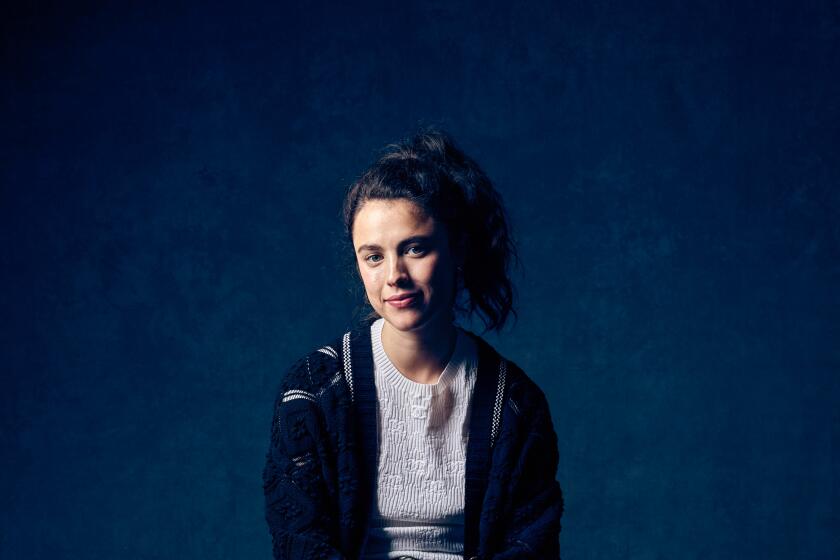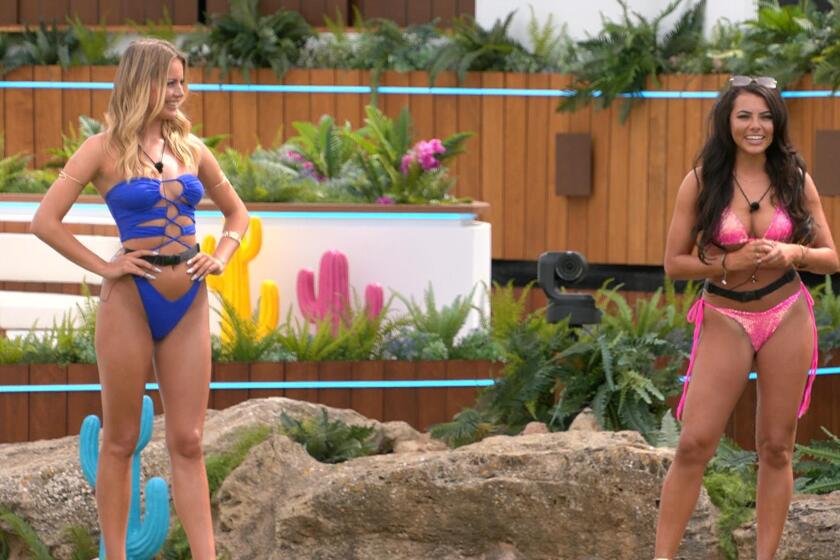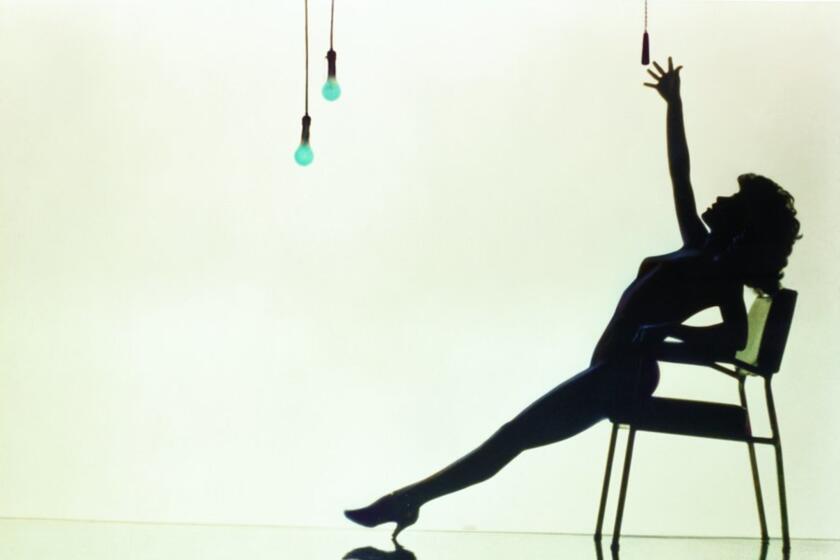‘It’s all in the lead-up’: Hollywood stars open up about role-play, sex scenes and more
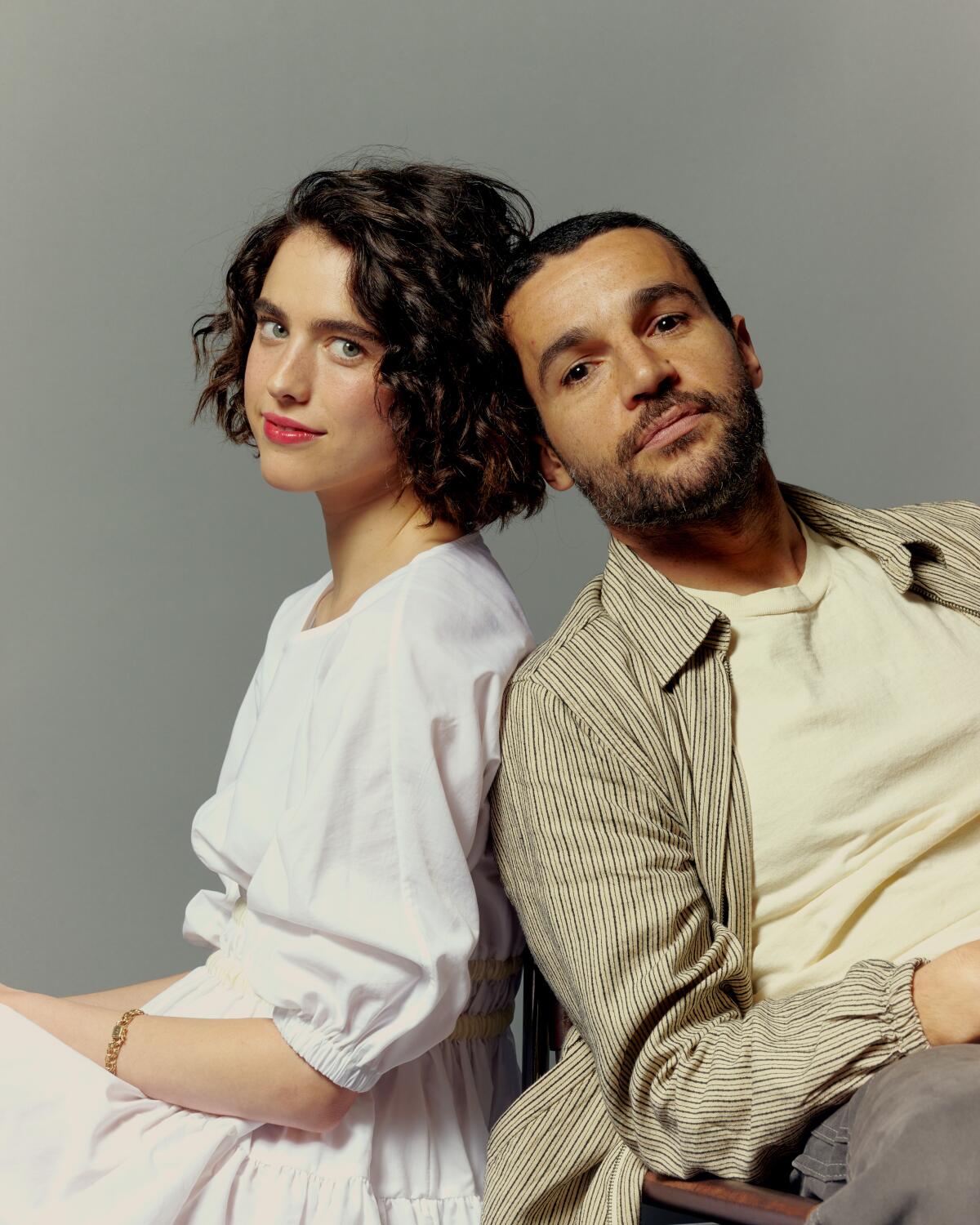
- Share via
Two people in a hotel room equals infinite possibilities. Business. Pleasure. Emotional connection. Intense passion. Erotic play. Just about anything could happen. And in the new film “Sanctuary,” just about anything does.
Directed by Zachary Wigon from a screenplay by “Homecoming” co-creator Micah Bloomberg, the film opens with Hal (Christopher Abbott) sitting before Rebecca (Margaret Qualley) for a seemingly innocuous HR interview, as he is about to inherit a chain of hotels. That much — the inheritance — is real. As the questions become more intimate, though, we learn that Rebecca is a sex worker, and that this is one of their regularly scheduled sessions. Hal tries to break things off, feeling that in his new position he can’t continue their relationship. Rebecca apparently refuses to accept the end of their arrangement, setting in motion a series of power plays between them and throwing into question who‘s really in charge.
In ‘Margaret,’ Lana Del Rey suggests Qualley’s wedding to Del Rey collaborator Jack Antonoff is Dec. 18. We caught up with the actor to ask about it.
A dazzling showcase for Qualley and Abbott, two performers skilled at concealing and revealing in equal measure, “Sanctuary” will likely spark conversations among audiences about what really happens in that room. With its games within games, fluid dynamics and shifting truths, the movie at times feels like it is daring the audience to keep up. But Wigon didn’t intend the film as a provocation.
“I’m always interested in trying to do something that’s going to be psychologically interesting and insightful and get to some unexpected or profound truths about human psychology,” Wigon said. “It’s almost like a way to visually represent what goes on in the unconscious. So maybe there are things that are provocative inherently in that mission, but I’m not interested in intentionally trying to provoke anyone. That’s not my MO.”
Wigon, Abbott and Qualley recently sat down with The Times to discuss some of the hot-button topics that people will be talking about after seeing the movie. (Mild spoilers ahead.)
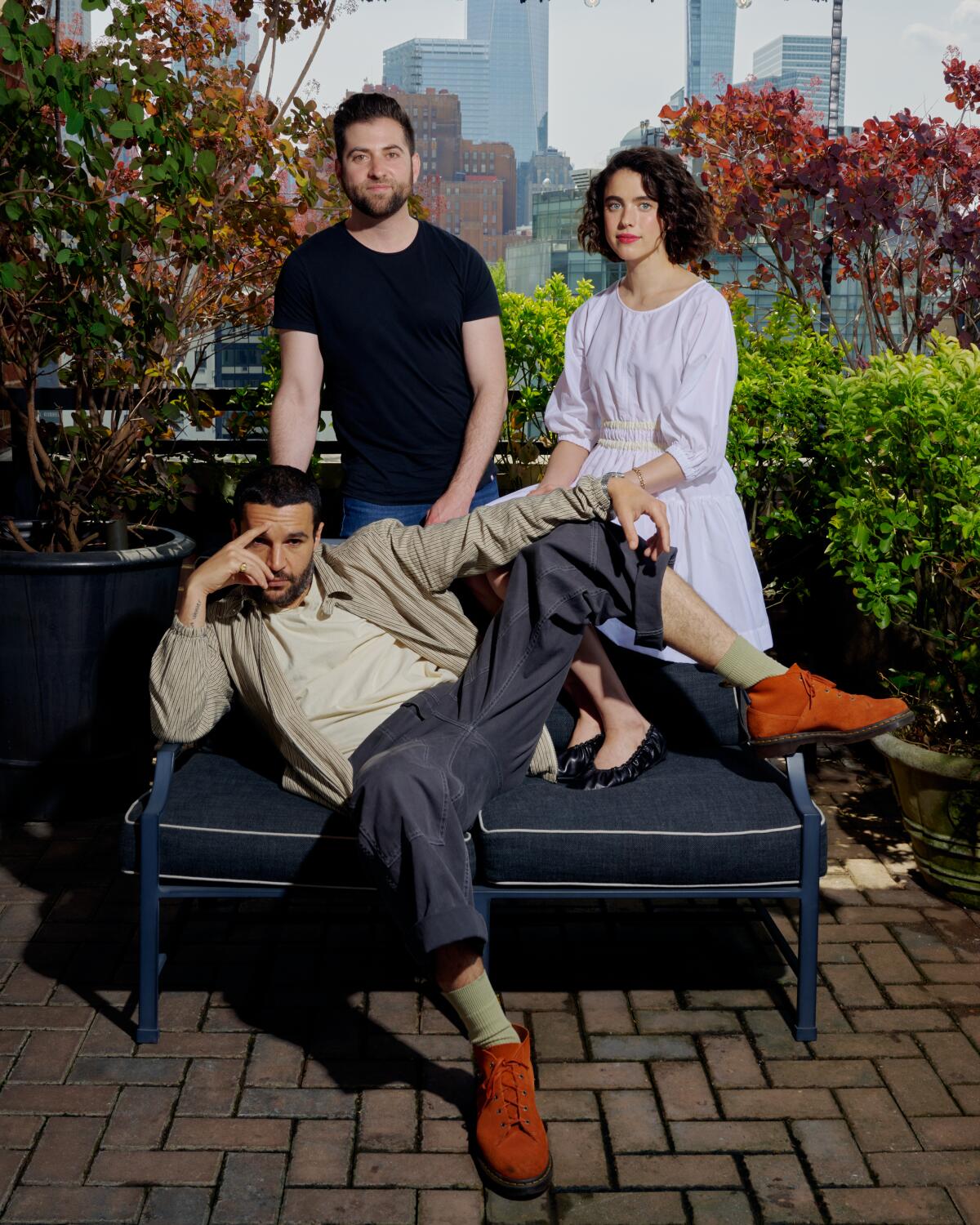
Is this an erotic thriller or a rom-com?
Margaret Qualley: I vote rom-com, but honestly, Zach’s going to be way better at answering this than I would ever be.
Zachary Wigon: It’s something I was thinking about a lot when we were developing the script and thinking about what this could be. It’s really interesting from a film theory or film criticism perspective, to think about those two genres and the way that they talk to each other. I love old screwball comedies, like “His Girl Friday” or “Bringing Up Baby,” and in those movies the characters often behave really awfully toward one another. But it’s all played for great comedy.
And then on the flip side of things, you can look at a number of psychological thrillers or erotic thrillers and see that they’re right up against the line of comedy in the way that a lot of the scenes play. I’m a huge fan of “Eyes Wide Shut,” and the Metrograph screens it at Christmastime every year. I go frequently, and people laugh a lot throughout the film and not in a derisive way.... There’s this kind of secret passageway that connects those genres.
Margaret, why would you consider this a rom-com?
Qualley: It just feels pretty innocent. I may be saying really raunchy things, but it feels like good-natured fun to me.
In Screen Gab No. 41, we mark the official start of summer with YA, trashy reality, art house movies and more.
Did you like the way that the story explored this idea of role-play? At first it’s in this more explicit sexual sense, but then it evolves into being about how we’re all kind of playing roles every day throughout our lives.
Wigon: For me, absolutely. I’d be so curious to hear Margaret and Chris’ takes as well, because they of course play roles for a living. I do think there’s something in the movie about this idea of, is what Hal and Rebecca do in that room really fundamentally different from what everyone does in the world, or is it just a matter of degree?
It’s a movie about two people who are not entirely happy and comfortable with who they are in the real world. And once a week for a designated period of time in a designated space with a designated set of rules, they’re able to transform into the truer version of themselves. And that feels a lot to me like what it is to be in show business, make movies. There’s a lot of talk in the film about, of course, role-playing, writing, say the words that I told you to say. I think about the movie a lot in relationship to filmmaking.
Christopher, was it unusual at all to be acting in this story that is in part about acting?
Christopher Abbott: What was fun was being able to play with the levels of, how good of actors are the characters? When they’re role-playing, sometimes they’re really good at it and sometimes they’re purposefully overacting. It was a fun challenge.
Qualley: Chris gets to decide not to be good. For other people, it just happens to us.
Abbott: This is my safety net in case anyone doesn’t like me in it. I’m just going to say it was a choice.
Qualley: One thing that I’m really fascinated by is, we’ve all made all these decisions about who we are and the way that we do things in the world. There’s certain things that are subconscious, inherent reactions that are just kind of happening because you’ve made all of these decisions beforehand about how you do things, like your voice in an Uber and the way that you talk to your boyfriend’s parents or when you’re checking out at the grocery store.
It’s all of this lived and learned behavior, how you’re operating in the world, like the set of guidelines that make up who I am. Sorry, this is super heady, but one of the things that I relished about playing Rebecca was that she didn’t have that. There wasn’t a set of guidelines that she’d made for herself. Maybe in her real life, but within the context of this room, all of that goes out the window. Every single thing is second-by-second. And because of that, there’s an infinite amount of things that she could be doing.
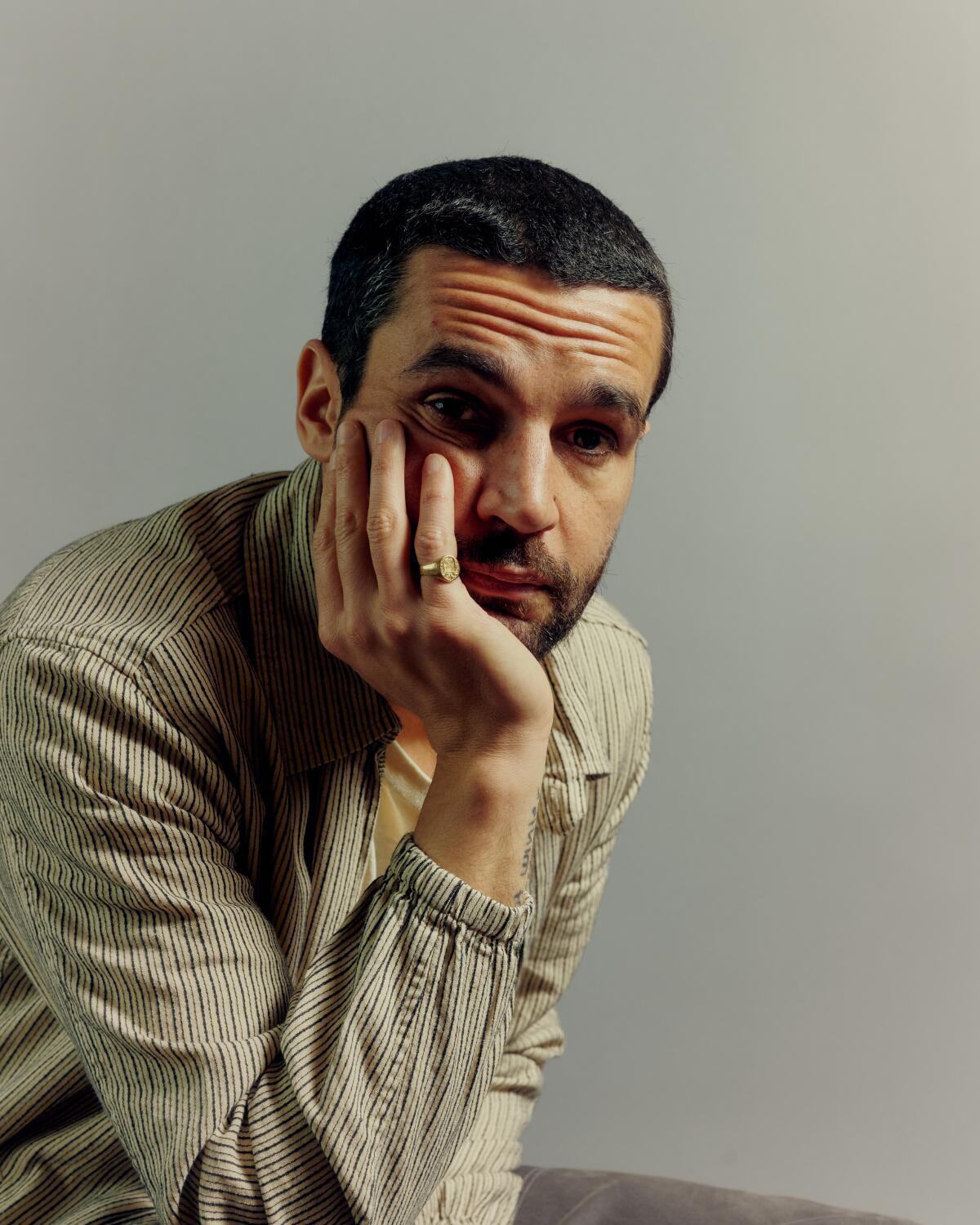

It’s revealed pretty early in the story that they’re playing off of this script and reciting dialogue to each other. And we see a page of the script. But is that the end of the script? From there forward, is what we’re seeing unscripted? There’s a sense that there are games upon games and you’re never really sure what’s truly real between them.
Wigon: I am answering your question with another question, but isn’t it fascinating how that’s kind of what life feels like sometimes? We go through our lives and it’s like, “OK, wait, is this real now? Is the person I’m interacting with genuine? Can I trust this? Is this emotional truth? Or is there something more calculated and motivated going on?” I think so much of life is you’re trying to figure out, “Wait, is this scripted or is this real?”
Margaret, did you like that there’s this uncharted quality to a lot of it? As a viewer, you’re not really sure what’s happening between them.
Qualley: Because their relationship is so compartmentalized, there’s no real floor there. Like if you fall, you might fall very, very far. And that’s inherently exciting and makes for very high stakes. I don’t know if I’m supposed to say all of this, it’s probably cool if I’m more mysterious, but in my mind, the script ends when the script ends, and everything that happens from that point on is really happening. Hal had anticipated this being their last session, and that’s not OK with Rebecca because she’s in love with him and she’ll do absolutely anything that she can within her power to change that.
As ‘Flashdance’ celebrates its 40th anniversary, director Adrian Lyne looks back on his career and reveals how the era-defining hit came together.
How did you grapple with that, Christopher, as far as what was or wasn’t scripted between the characters?
Abbott: I really love the idea of keeping the audience on their toes in terms of when it would stop because there’s a few other points in the movie where I think you realize, “Oh, that was scripted as well.” And that whole idea lends itself to the “power dynamics” that the characters have with each other. But it’s not even necessarily power dynamics. It’s about what they’re doing to each other, but also for each other. And the layers that get pulled back, I think, is the realization that each of them are quite unhappy, and they find common ground and this sort of love in this loneliness that they both have.
I’ve read a few descriptions of the movie, and it will say “dominatrix,” and it always makes it sound more salacious than it plays.
Qualley: Completely. I think that’s exactly why I was saying that I would think it was a romantic comedy more than a dark romantic thriller, for that very reason. Because it’s not like there’s bondage or S&M. I keep my clothes on the whole time. It’s just about the language. And if this is a dominatrix thriller, it’s the dorkiest dominatrix thriller I’ve ever seen. What really gets me going is two people almost kissing. And I think that you get that feeling in this movie.
Abbott: Whoa, whoa, settle down, Margaret. Settle down.
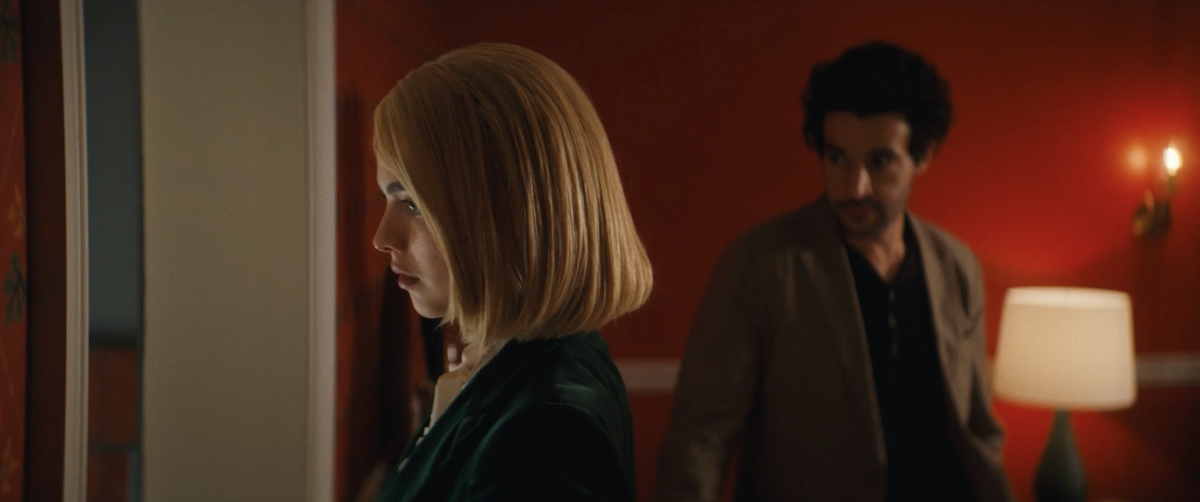
It’s so interesting to hear you say that, Margaret, because people talk a lot about how movies now are kind of sexless, and you are a performer who doesn’t shy away from that. Your performance in “Stars at Noon” is a great example of what the purpose of sex scenes and nudity can be in a story. I’m curious what you think about that, and when you’re approaching projects, what makes you decide whether you want to do something like that or not?
Qualley: I don’t usually find the sex scenes hot. I find sex scenes intimate sometimes, or revealing, vulnerable — they can tell you a lot about a character — but I don’t usually find them very hot. Whereas I find two people flirting, or when you can tell two people want to kiss, that’s very hot. It’s all in the lead-up.
Zachary, was that something you were conscious of, the fact that the story can sound dirtier than it is?
Wigon: Absolutely, I was conscious of that. Going off of what Margaret was saying about how sometimes two characters flirting, that’s almost more sexually charged than an actual sex scene, there’s something about psychological connection that is much more interesting. It’s much more interesting onscreen to see two people who are linking up in a certain way psychologically than actual physical depictions of sexuality. There is sexuality in the movie, but I always thought of the sexuality as a means to an end. And the end was the psychological probing of the characters’ minds by one another. They’re using sexuality at times like a lever or like a wedge or a tool to get deep down into the minds of one another. But it was always about what makes these people tick.
Christopher, what was it like for you that here you’re the one who takes your clothes off and you have the most explicit moments in the movie?
Abbott: I’ve done other things where [this is] kind of tame by comparison. Not even things I’ve done, but other movies in general.
Qualley: His last porn was way more revealing.
Abbott: With the strike, I’m thinking about it. I’m just kidding. But for this movie, it’s sort of fun to have the themes of those, whatever you want to call them, a la ’80s, ’90s, sort of sexy thrillers, but the fact that it’s really just about a connection between two people, and ultimately really a love story is what it’s more about. Otherwise, I have no shame. I’ll do anything.
More to Read
Only good movies
Get the Indie Focus newsletter, Mark Olsen's weekly guide to the world of cinema.
You may occasionally receive promotional content from the Los Angeles Times.
